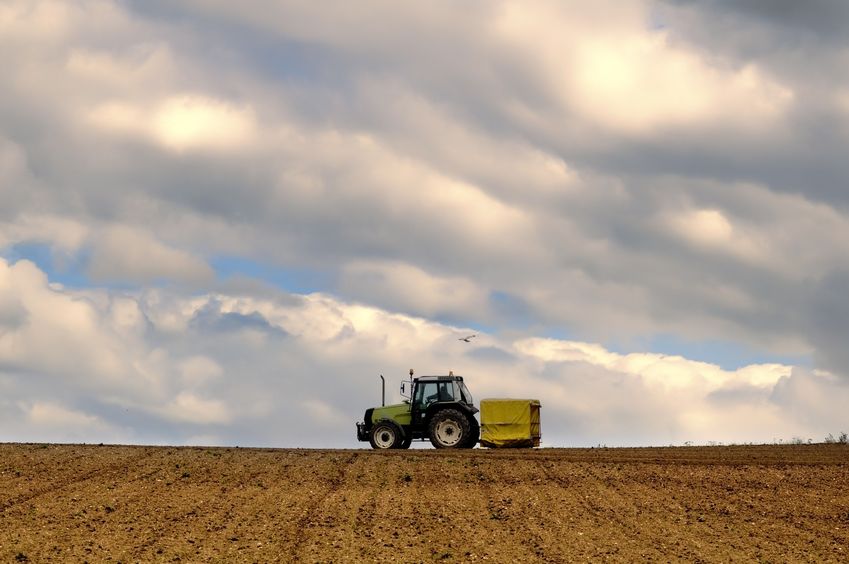Brexit: NFU releases document outlining new domestic agricultural policy

The National Farmers' Union has released a new document outlining what it would like the government to adopt as part of a new domestic agricultural policy.
The document aims to ensure UK farming is profitable and competitive in the future as the UK leaves the EU.
The paper, entitled 'Delivering a Bold and Ambitious Future for Farming' sets out opportunities for a British agricultural policy.
It builds on the key themes the NFU sees as being integral to an agricultural policy; volatility, productivity and the environment.
NFU President Meurig Raymond said it’s "what farming and Britain needs" and urged the Government to adopt the measures to help make a success of Brexit for the nation.
“For decades, UK farming has been subject to policies set at a pan-European level, implementing successive CAP reforms driven from the European stage”, said Mr Raymond.
“Once we leave the EU, we will have the opportunity to develop a new deal for British farmers and citizens – one in which farm businesses are provided with the incentives, rewards and means to become more profitable and resilient and to better meet the expectations and needs of society at large.”
Below are a list of measures the document suggests could be implemented in the new agricultural policy.
Lack of market data
In terms of combatting volatility, the report says the UK currently lacks the quality of market data, experience or institutional capacity required to deliver more targeted volatility mitigation measures for farmers.
In order to facilitate their development, the government has been urged by the NFU to improve the provisioning and reporting of such market data.
Improvement in market data will also support the development of market linked pricing mechanisms in
the supply chain, which in turn can be used to drive greater productivity, the report suggests.
The UK currently has very limited experience of delivering market-orientated volatility mitigation schemes.
Therefore, the document explains that a range of pilot schemes would build the UK’s capacity to understand how such schemes could be best structured and delivered to support farmers and incentivise uptake.
Specifically, it states that a market-orientated revenue insurance/countercyclical payments programme to support farmers in smoothing their income profile would be the most helpful.
The report goes on to say that small scale pilot schemes could be delivered during the transition period post-Brexit, which if successful could then be scaled up over time.
The government would be required to play a crucial role in subsidising premiums to affordable levels, procuring and reporting on market data and overseeing the delivery of the scheme by private insurers with technical delivery expertise.

Amber box measures
When the UK leaves the EU it will establish its own schedules at the World Trade Organisation (WTO).
Importantly, some of the measures that combat volatility and potentially the measures underpinning the
environment and productivity cornerstones would likely need to be structured as Amber Box measures, the report explains.
Amber Box measures are those government policies that are considered trade distorting and countries
have agreed limits on how much they spend on such policies.
The EU has an overall limit on such spending that was calculated during the base period of 1986-1988. When the UK leaves the EU, it will need to decide how it deals with its share of the EU’s ceiling.
In order to ensure sufficient flexibility in the design of volatility mitigation measures, the report warns that it is important the UK looks to achieve a proportionate Amber Box allowance. Failure to do so will significantly restrict policy options in the long term.
Pilot schemes for productivity
The NFU believes that the government should consider developing public private partnerships, for example with research institutes, farm suppliers, processors and major retailers, to deliver and financially support pilot schemes that aim to improve farm productivity.
A number of leading retailers have dedicated supply chain farmer groups that could be well placed to undertake trials and pilot schemes, the NFU explains.
The report says investment and implementation of IT and digital solutions that drive competitiveness of farming is vital, for instance through rolling out data systems that enable two-way flow of livestock movement and carcass quality reporting to benefit producers as well as processors.
Rural Development Programme
Existing funds to improve farm productivity are suffering from low uptake and underspend has been observed in the Rural Development Programme for England (RDPE).
The report states that in many instances, an "onerous" and "bureaucratic" application process has led to delays in the processing of grant applications.
It is recognised that the costs and time involved in making an application are very often out of proportion with the actual funding on offer resulting in a low uptake of grant applications and reluctance to apply for future funding.
The NFU says there is "clearly a need" for these schemes to take better account of the farmers’ perspective in order for them to be successfully delivered and this must start in the design phase.
Promoting schemes and making them accessible and navigable is key to increasing uptake in the short term, the report says.
The NFU would like to see the RDPE budget spent effectively on improving farm productivity rather than being lost to the industry. The union warns that the existing underspend must not be seen as evidence of little or no demand.
Farmer engagement
The NFU believes that competitive food production is not at odds with successfully managing the environment.
The report states that farmers "must be at the heart" of future environmental policy development and be seen by government as critical to policy success.
The farming union says that engagement must start early in order to ensure ambitious policy objectives are achievable and are accompanied by delivery systems that are fit for purpose.
There are a number of approaches that may need further developing and piloting that could form part of a future farmed environment scheme, e.g. outcomes or results based schemes, reverse auctions and trading platforms.
The report urges the government to ensure that pilots and trials are in place and cover a range of environmental objectives.
Improve existing offer
Improvements to the current Countryside Stewardship (CS) scheme should be seen as an opportunity to test some of the features of realising a new farmed environment scheme and other new delivery methods, the NFU's report explained.
The document has identified a number of recommendations to improve the current scheme and is actively working with Natural England and Defra to deliver these improvements in the short term.
It says payments need to offer a greater form of incentive and reward for participation in agri-environment schemes.
It goes on to say that this can be achieved in the short term through reviewing payment calculations, more proportionate penalties and reducing administration.
The report says government must seek to address the limitations of WTO rules that stipulate payments for environmental schemes must be based on income foregone and cost incurred.








